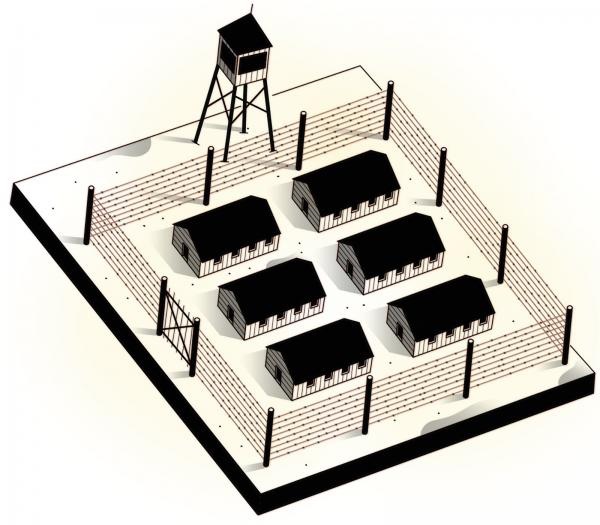What It's Like - Be a POW
.jpg)
Be a POW
Asher Schroeder
Rotary Club of Maquoketa, Iowa
I was 18 when I was drafted. I turned 19 in Europe. I landed in Normandy a week after the D-Day invasion as a replacement for casualties that occurred during the initial assault. I was a part of the liberation of Paris on 25 August 1944. That November, I was with a group of soldiers that was surrounded for four days by Germans in the Hürtgen Forest in Germany. I had been wounded and was lying in a foxhole. We had been cut off from all supplies – ammunition, food, water, and medical supplies. The officer in charge decided to try to get the able-bodied out. They took off very early one morning and left 14 of us wounded behind.
Later that day, German forces came through. Once they satisfied themselves that we were wounded, they told us to get back in our holes and to stay there, “as the next German group that comes through might shoot you.”
 We were moved out by German litter bearers and taken to a collection point for wounded. I was taken to Düren, where shrapnel was removed from my wounded foot. Then I was moved to Siegburg, across the Rhine. They put me up in the attic of an old monastery, and I was there three weeks using crutches. I was lucky – the day after I left Düren, U.S. planes mass-bombed the city and flattened it. I would have been killed if I hadn’t been moved.
We were moved out by German litter bearers and taken to a collection point for wounded. I was taken to Düren, where shrapnel was removed from my wounded foot. Then I was moved to Siegburg, across the Rhine. They put me up in the attic of an old monastery, and I was there three weeks using crutches. I was lucky – the day after I left Düren, U.S. planes mass-bombed the city and flattened it. I would have been killed if I hadn’t been moved.
Then I was moved to a recovery camp west of Cologne and was there during the Battle of the Bulge. We found out about it after a big dogfight had erupted over the prison camp and planes were shot down. An American pilot who parachuted out landed in our camp and told us what was going on. We had no idea the Bulge was underway, so that was our introduction to that.
After that, I gradually could hobble around and was moved again, to a place outside Bonn. I had crossed the Rhine three times since being captured, and the last time I walked across.
The conditions seemed to deteriorate more and more with each camp. We were infested with lice, we were given what the Germans called “soup,” which was just things boiled in hot water with no seasoning. Once, we found the jaw of a horse at the bottom of the pot. We argued over who would get to pick it over. There were no lights, no heat, no running water, just tarpaper shacks. In the last three camps, our accommodations were straw on the floor. We were packed tightly in with only our bodies to keep us warm.
When I was liberated, I had on the clothing I was wearing when I was captured five months earlier. My weight had dropped from 210 pounds to 128 pounds. At 6-foot-4, I was a bag of bones.
I returned to the States in May 1945. They gave us a free telephone call home. I was on top of the world, and my mother came on the line. After we visited for a few minutes, I asked how come Dad didn’t answer the phone. She said, you didn’t get any of our messages or hear from Red Cross? I said, you mean he’s dead? She said yes, he died on the day you were liberated, April 2. So what was the greatest day of my life turned into the most terrible day of my life.
– As told to Heather Maher